- Homepage
- International
- Virtual resources
- Ghana video lecture series
- Chemical pathology webinars
Chemical pathology webinars
This lecture series supports the chemical pathology membership and fellowship training programmes for the Ghana College of Physicians and Surgeons.
Ghana lecture series 2
Membership
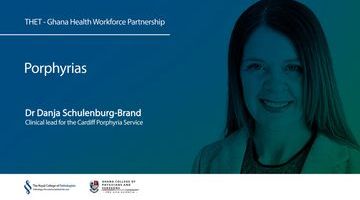
Dr Danja Schulenburg-Brand
This lecture provides a brief overview of the porphyrias. The haem biosynthesis pathway is discussed in the context of the different porphyrias and the pathogenesis of acute attacks. The acute hepatic porphyrias and the most common cutaneous porphyrias, Porphyria Cutanea Tarda and Erythropoietic Protoporphyria, are discussed in terms of etiology, presentation, management and complications. The laboratory diagnostic approach to acute and cutaneous porphyrias are described. Finally, example cases are shown with signposting to further resources.
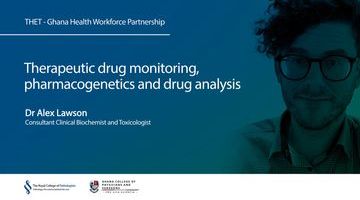
Dr Alex Lawson
In this lecture we will briefly discuss the rationale behind what constitutes successful TDM regimes, identify the role of pharmacogenetics in TDM and to give an overview of the techniques used for TDM measurements.
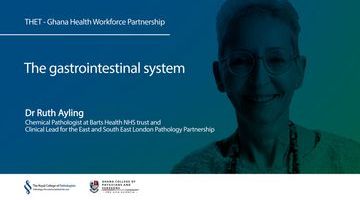
Dr Ruth Ayling
This lecture covers GI conditions including a spectrum of organic and functional disorders. Including how Many GI tests are invasive and laboratory investigations help prioritise patients that require these and enable others to avoid them. As well as how tests can be used to assist diagnosis, management of disease and in choice and monitoring of treatment.
Fellowship
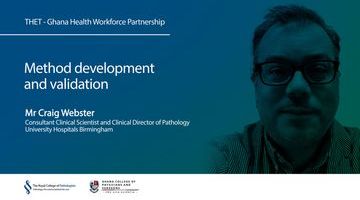
Mr Craig Webster
This lecture will cover how to develop measurement methods, validate them and introduce the methods into service with appropriate reference intervals, as well as how to develop metrological traceability, international reference materials, calibrants and controls
This lecture series was created in 2022, but is still relevant for the chemical pathology membership and fellowship training programmes.
Ghana lecture series 1
Membership
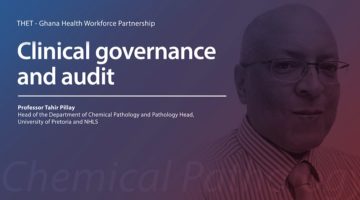
Professor Tahir Pillay
This lecture will examine the role of audits in the management of a clinical laboratory service and continuous quality improvement. The relationship between clinical governance and audit will be discussed. We will examine the process and steps in carrying out a laboratory audit as well as comparing it to research. The audit cycle will be analysed and role of evidence-based medicine in continuous quality improvement will be outlined.
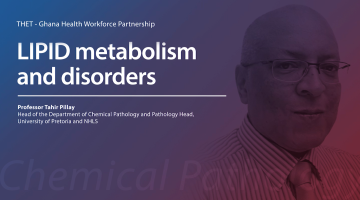
Professor Tahir Pillay
This lecture will commence with an overview of lipid and lipoprotein structure and metabolism followed by a discussion of lipid investigations. This will be followed by an examination of the disorders of lipid metabolism and cardiovascular risk management. The latter part of the lecture will outline diseases associated with lipoprotein deficiency. In addition, there will be a brief discussion of myocardial infarction, cerebrovascular disease and peripheral vascular disease as they relate to disorders of lipid metabolism.

Dr Rivak Punchoo
This lecture will provide an overview of essential clinical biochemistry topics in nutrition. Nutritional requirements and laboratory assessment of nutrients will first be discussed, with an emphasis on major organic and inorganic nutrients and micronutrients. Then, the common nutritional disorders will be explored, highlighting biochemical abnormalities. Finally, laboratory aspects of nutritional support will be discussed.
Fellowship

Dr Bettina Chale-Matsau
The lecture will cover laboratory aspects of serum protein electrophoresis (SPE) and serum free light chains. Serum protein electrophoresis is a powerful tool used in the investigation of patients suspected of monoclonal gammopathy and other protein disorders. It separates proteins based on their physical properties. Abnormal proliferation of plasma cells is demonstrated by a monoclonal protein (M-protein), which can be identified using immunofixation (IFE). Serum free light chain testing methods have increased sensitivity compared with SPE and IFE.

Dr Tumelo Satekge
Description of key biochemical processes including phenylalanine/tyrosine pathway, glycolysis, gluconeogenesis, glycogen, galactose, branched chain amino acids metabolism, urea cycle and fatty acid oxidation with the carnitine shuttle. Description of clinical approaches, routine biochemical and specialised investigations of essential inborn errors of metabolism, namely aminoacidopathies, phenylketonuria, galactosaemia, glycogen storage diseases, organic acidemias, fatty acid oxidation disorders and urea cycle disorders.

Dr Janine Martins
This lecture aims to provide an understanding of evidence-based medicine and an introduction to critical assessment in evaluating journal articles, essential for continued professional development programmes and in all facets of laboratory roles. The module explores the hierarchy of evidence, grading system and the approach to analysis of published work. The presentation considers how to apply evidence-based laboratory medicine for problem-solving and for implementing new laboratory tests. It also explores research & development in the laboratory context.

